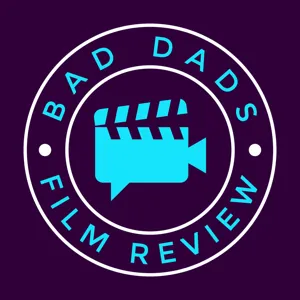The Kitchen & Mr Blobby

Welcome back to another episode of the Bad Dads Film Review! Today, we're celebrating the beautiful game with a look at the top 5 soccer player cameos in movies, stirring the pot with a review of The Kitchen (2023), and taking a nostalgic trip back to the chaotic world of Mr. Blobby.
Top 5 Soccer Player Cameos in Movies:
- David Beckham in King Arthur: Legend of the Sword (2017) - Beckham's appearance as a disgruntled soldier overseeing Arthur's attempt to pull Excalibur from the stone adds a touch of modern celebrity to this ancient tale.
- Pelé in Escape to Victory (1981) - The legendary Brazilian footballer stars alongside Michael Caine and Sylvester Stallone in this classic WWII prisoner-of-war escape film. Pelé's unforgettable bicycle kick remains one of the movie's highlights.
- Zinedine Zidane, David Beckham, and Lionel Messi in Goal II: Living the Dream (2007) - This sequel features cameos from some of the biggest names in early 2000s football, adding authenticity and star power to the film's Real Madrid setting.
- Eric Cantona in Elizabeth (1998) - The charismatic Frenchman swaps his football kit for medieval armor in this historical drama, showcasing his versatility beyond the football pitch.
- Cameo appearances by multiple 1966 England World Cup team members in Those Magnificent Men in Their Flying Machines (1965) - Though not a soccer film, this comedy classic features cameo appearances by England's World Cup heroes, adding a layer of national pride to its high-flying antics.
Main Feature - The Kitchen (2023):
The Kitchen (2023), co-directed by Kibwe Tavares and Daniel Kaluuya is the story of Izi, a solitary man desperate to leave "The Kitchen," who meets Benji, a young boy who lost his mother. Their unlikely bond develops as they navigate the harsh realities of their world, facing issues like poverty, displacement, and the fight for survival. We'll take a look and see how successfully the movie deals with it's themes of social inequality, community, fatherhood and resilience.
Nostalgia Corner - Mr. Blobby:
For a lighter note, we're revisiting the unforgettable Mr. Blobby. A staple of British television in the 1990s, Mr. Blobby's slapstick humor and distinctive pink and yellow polka dot appearance left an indelible mark on pop culture. While his chaotic antics might not be for everyone, Mr. Blobby remains a nostalgic figure for a generation of viewers, representing a simpler, albeit bizarre, time in children's entertainment.
Whether you're here for the soccer, in anticipation of The Kitchen, or just for a walk down memory lane with Mr. Blobby, today's episode has something for every kind of dad. Join us as we explore the intersections of sports, cinema, and nostalgia, only on Bad Dads Film Review. 🎬⚽🍳👨👧👦🍿
We love to hear from our listeners! By which I mean we tolerate it. If it hasn't been completely destroyed yet you can usually find us on twitter @dads_film, on Facebook Bad Dads Film Review, on email at baddadsjsy@gmail.com or on our website baddadsfilm.com.
Until next time, we remain...
Bad Dads








